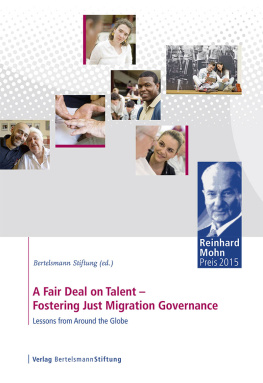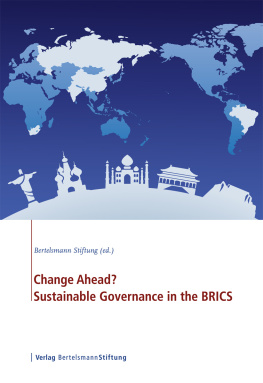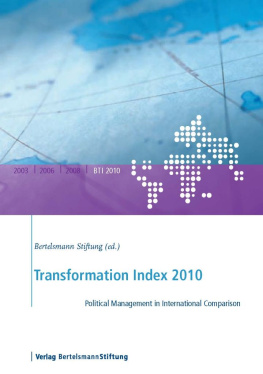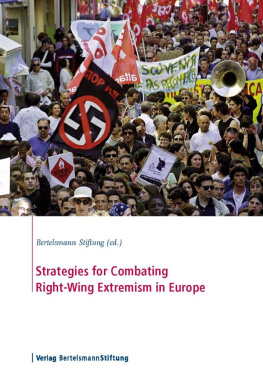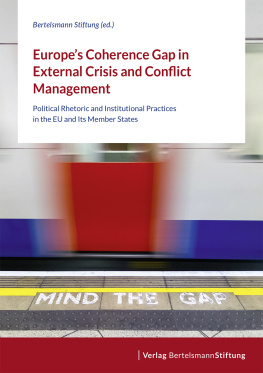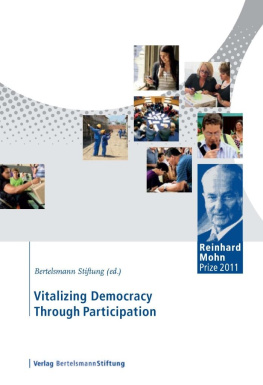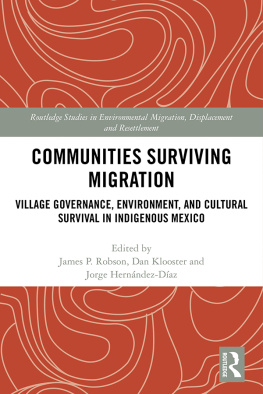Bibliographic information published by the Deutsche Nationalbibliothek
The Deutsche Nationalbibliothek lists this publication in the
Deutsche Nationalbibliografie; detailed bibliographic data
is available on the Internet at http://dnb.d-nb.de.
2012 E-Book-Ausgabe (EPUB)
E-Book-Ausgabe 2012
2012 Verlag Bertelsmann Stiftung, Gtersloh
Responsible: Dr. Christal Morehouse, Michelle Mittelstadt
Copy editor: Fayre Makeig
Production editor: Christiane Raffel
Cover design: Elisabeth Menke
Cover illustration: Hill Street Studios/Getty Images
Typesetting and Printing: Hans Kock Buch- und Offsetdruck GmbH, Bielefeld
ISBN : 978-3-86793-475-6
www.bertelsmann-stiftung.org/publications
www.bertelsmann-stiftung.de/verlag
Table of Contents
Introduction
Demetrios G. Papademetriou, Jrg Drger
Globalization has been rewriting more than just the rules of economic behavior among nations. It has also created and nurtured the conditions for greater human mobility, with unprecedented levels of diversity transforming communities and challenging closely held notions of national identity. The Transatlantic Council on Migration, an initiative of the Migration Policy Institute with policy support from the Bertelsmann Stiftung, convened in Berlin on November 16 18, 2011 to examine the role migration plays in the social unrest seen in societies on both sides of the Atlantic. The Councils goal: help shape a new vision for social cohesion that harnesses diversitys potential benefits for all elements of society.
While a consensus may be emerging as to what has not worked well in the realm of immigrant integration (albeit with some misunderstanding, such as the role of multiculturalist policies), less thought has been given to proactively articulating a new social contract to bring immigrants and natives together in pursuit of shared goals. This volume the Councils sixth edited volume contributes to the debate by offering ideas for the next generation of policies that can build more inclusive civic identities. The book, which contains in-depth analyses and policy recommendations, builds on the Councils prior volumes: Delivering Citizenship (November 2008); Talent, Competitiveness and Migration (April 2009); Migration, Public Opinion and Politics (November 2009); Prioritizing Integration (April 2010); and Improving the Governance of International Migration (November 2011). The resulting collection deepens the evidence base on the complex migration and integration issues that challenge transatlantic societies.
The volume opens in Section One with the Councils statement on Rethinking National Identity in the Age of Migration. Demetrios G. Papademetriou and Ulrich Kober distill the main themes and recommendations that emerged from the Transatlantic Councils meeting in Berlin on how to mitigate the disorienting effects of rapid societal change. The authors dissect the roots of societys anxiety about immigration and put forward ten innovative policy ideas that can help create the conditions for cohesive societies. They argue that the key to fostering greater cohesiveness is to involve all citizens in the process of shaping the new we.
Section Two, Managing Diversity in Challenging Times, offers in three chapters three perspectives on the perceived failure of integration models in many Western democracies. Will Kymlicka begins this section with his chapter on Multiculturalism: Success, Failure, and the Future. His analysis challenges four powerful myths about multiculturalism and discusses the factors that can either facilitate or impede its successful implementation.
In Chapter Two, Cas Mudde focuses on the complex relationship between migration and the rise of radical-right political parties in three industrialized regions: North America, Western Europe, and Central and Eastern Europe. Titled The Relationship Between Immigration and Nativism in Europe and North America, this chapter charts the uneven success of far-right parties in these regions and analyzes the diverse state responses. The author shows that the relationship between immigration and extremism is not as clear-cut as is often assumed.
Christian Joppke is the author of Chapter Three, The Role of the State in Cultural Integration: Trends, Challenges, and Ways Ahead, which examines how different European approaches to cultural integration have converged in important ways. Many liberal states have constitutional restrictions on state intervention in sensitive identity issues, which are for the individual and not the state to decide. A second commonality, for over a decade now, is civic integration policies that seek to bind newcomers to majority institutions and culture by requiring them to learn the host-society language and acknowledge basic host-society norms and values. This chapter concludes with recommendations on how governments may achieve a mode of civic integration that is restrained enough to respect the moral autonomy of immigrants and aggressive enough to further a more cohesive and integrated host society.
Section Three, Country Perspectives, contains eight case studies on national identity in the age of migration. It examines the lessons that can be drawn from different approaches to immigrant integration and diversity in North America and Europe, looking specifically at Canada, France, the United States, Germany, the Netherlands, the United Kingdom, Spain, and Norway.
In Chapter Four, Irene Bloemraad takes an in-depth look at the Canadian approach to pluralism. She asks whether Canada is truly an outlier in terms of being able to deflect anti-immigrant sentiment and opposition to multicultural policies directed at immigrants and settled minority groups. In her piece on Understanding Canadian Exceptionalism in Immigration and Pluralism Policy, Bloemraad concludes that immigrant selection policy and geography are not sufficient to explain why Canada is more open to and optimistic about immigration: The Canadian view of immigration as a nation-building exercise is also a key factor.
Patrick Simon examines Frances controversial public debates on national identity in Chapter Five, French National Identity and Integration: Who Belongs to the National Community?. Concerns that the split allegiances of foreigners might weaken social cohesion in France are examined systematically using the findings of the Trajectories and Origins: a Survey on Population Diversity in France (TeO) study. The author strongly challenges the perception that ties to another country automatically undermine individuals commitment to France and argues that restrictive definitions of national identity can be counterproductive.
Chapter Six, Contested Ground: Immigration in the United States, is by Michael Jones-Correa. As immigration to the United States has increased and spread to new regions, there have been growing concerns that it has negatively impacted the US economy and altered the social fabric of society. This chapter analyzes the roots of American anxiety about immigration particularly illegal immigration and the policy responses implemented over the past 50 years.
Naika Foroutan is the author of Chapter Seven on Identity and (Muslim) Immigration in Germany. Germany is already a diverse country and will become increasingly so over time. One-fifth of the population is comprised of immigrants or the children of immigrants and, in many of Germanys largest cities, a majority of children under the age of 6 have a so-called migration background. However, while Germany has become a country of immigration during recent decades, a still dominant perception in media and public discourse is that of a homogenous German society in which those with a migration background cannot fully belong. Muslims have become a focus of public debate despite comprising only 5 percent of the population, and German public opinion contains some of the strongest anti-Muslim sentiments in Western Europe. This chapter concludes with recommendations on how policymakers can combat negative stereotypes and develop a new national narrative reflective of Germanys demographic reality.


